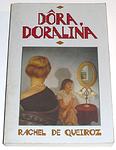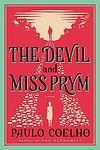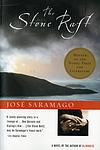The Greatest Portuguese, Brazilian "Fiction" Books Since 1950
Click to learn how this list is calculated.
This list represents a comprehensive and trusted collection of the greatest books. Developed through a specialized algorithm, it brings together 300 'best of' book lists to form a definitive guide to the world's most acclaimed books. For those interested in how these books are chosen, additional details can be found on the rankings page.
Genres
Countries
Date Range
Reading Statistics
Click the button below to see how many of these books you've read!
Download
If you're interested in downloading this list as a CSV file for use in a spreadsheet application, you can easily do so by clicking the button below. Please note that to ensure a manageable file size and faster download, the CSV will include details for only the first 500 books.
Download-
1. The Alchemist by Paulo Coelho
A young Andalusian shepherd named Santiago dreams of finding a worldly treasure and sets off on a journey across the Egyptian desert in search of it. Along the way, he encounters a series of characters who impart wisdom and help guide his spiritual journey. The novel explores themes of destiny, personal legend, and the interconnectedness of all things in the universe. The boy learns that true wealth comes not from material possessions, but from self-discovery and attaining one's "Personal Legend".
-
2. The Book of Disquiet by Fernando Pessoa
"The Book of Disquiet" is a posthumously published collection of thoughts and musings of a solitary dreamer, who is a Lisbon-based bookkeeper. The book delves into the mind of a man who is discontented with his mundane life and finds solace in dreaming and writing. The narrative is a profound reflection on life, solitude, and the nature of humanity, filled with philosophical insights and poetic language. The protagonist's introspective journey and his struggles with existential despair make it a seminal work in the genre of literary modernism.
-
3. The Hour of the Star by Clarice Lispector
"The Hour of the Star" is a poignant narrative that explores the life of Macabéa, a poor, unattractive, and naive typist living in the slums of Rio de Janeiro. The story is narrated by Rodrigo S.M., a sophisticated writer who struggles with how to accurately portray Macabéa's simple existence and her tragic fate. The novel delves into themes of identity, poverty, and the human condition, presenting a stark contrast between the lives of the rich and the poor, the educated and the ignorant, and the beautiful and the plain.
-
4. The Devil to Pay in the Backlands by Joao Guimaraes Rosa
"The Devil to Pay in the Backlands" is a complex narrative that follows the life of a Brazilian sertanejo (backlands dweller) who becomes a bandit and a feared killer. Tormented by his violent actions, he embarks on a metaphysical journey, wrestling with philosophical and religious questions, and trying to reconcile his deep belief in fate and predestination with his own free will. The book is notable for its innovative language, blending regional dialects with neologisms and classical references, which adds to its rich portrayal of the Brazilian backlands.
-
5. The Year of the Death of Ricardo Reis by José Saramago
The novel is a metaphysical narrative about a doctor named Ricardo Reis who returns to Lisbon, Portugal after learning about the death of his friend. He finds himself in a society on the brink of dictatorship, and as he navigates through his daily life, he encounters his deceased friend's ghost and a hotel maid with whom he begins a love affair. The book explores themes of identity, love, and the nature of reality, set against the backdrop of political turmoil.
-
6. The Passion According to G.H. by Clarice Lispector
"The Passion According to G.H." is a philosophical novel that delves into the existential crisis of a wealthy Brazilian woman who, after killing a cockroach in her maid's room, experiences a profound metaphysical crisis. The narrative unfolds as a stream of consciousness that explores themes of identity, existence, and the nature of reality. The protagonist's journey forces her to confront her own humanity, the concept of nothingness, and the chaotic, interconnected nature of life. It's a profound and introspective exploration of the human condition and the meaning of existence.
-
7. Blindness by José Saramago
In this dystopian novel, an unexplained epidemic of "white blindness" sweeps through an unnamed city, causing chaos and panic. The government responds by quarantining the afflicted in an abandoned mental hospital, where conditions quickly deteriorate into violence and squalor. Amid the despair, one woman mysteriously retains her sight and guides a small band of the blind, including her husband, through the harrowing ordeal. The novel explores themes of loss, human nature, and the fragility of civilization.
-
8. Baltasar and Blimunda by José Saramago
"Baltasar and Blimunda" is a historical love story set in 18th century Portugal. The narrative follows a maimed soldier, Baltasar, and a young clairvoyant woman, Blimunda, as they navigate the hardships of life during the Inquisition. Their love story is intertwined with the construction of the Convent of Mafra, a grandiose project initiated by the King. The novel explores themes of love, faith, human resilience, and the struggle against political and religious oppression.
-
9. Veronika Decides to Die by Paulo Coelho
The novel centers around Veronika, a young woman from Slovenia who, disillusioned by her life and the world, decides to commit suicide. Surviving her attempt, she wakes up in a mental institution where she learns that her failed attempt has left her with only a few days to live. During her stay, she meets a variety of characters, each with their own mental issues, who help her to see her life in a new perspective. The story explores themes of madness, individuality, and the value of life, challenging societal norms and questioning the meaning of sanity.
-
10. Gabriela, Clove and Cinnamon by Jorge Amado
Set in the 1920s in the Brazilian town of Ilhéus, the novel tells the story of a beautiful and charismatic migrant worker, Gabriela, who becomes a cook in the home of a wealthy bar owner. As the town, historically dominated by a few wealthy cacao planters, undergoes economic and social changes, Gabriela and her employer fall in love. Their relationship, however, is challenged by their different social statuses, the town's traditional values, and the employer's political ambitions. The story is a vivid portrayal of Brazilian culture, exploring themes of race, gender, class, and tradition versus progress.
-
11. Tent of Miracles by Jorge Amado
"Tent of Miracles" is a satirical novel that explores the themes of racism, colonialism, and the power of knowledge. The story revolves around the life of a poor, mixed-race Bahian scholar who is unrecognized in his own land but becomes a posthumous celebrity when a Nobel laureate praises his work. This sudden fame brings attention to his writings and his message against racial discrimination, and the book also portrays the vibrant culture and diversity of Bahia, Brazil.
-
12. The Gospel According To Jesus Christ by José Saramago
This novel offers a provocative and humanized retelling of the life of Jesus Christ, diverging from traditional biblical narratives. It presents a Jesus who is all too human, grappling with the complexities of life, love, and a sense of destiny. Through a blend of biblical lore and imaginative fiction, the story explores themes of divinity, free will, and morality, challenging readers to reconsider the foundations of faith and the nature of storytelling itself. The narrative delves into Jesus's relationships, his encounters with figures such as God and the Devil, and ultimately portrays a deeply philosophical and introspective version of a figure central to Western civilization.
-
13. The Land At The End Of The World by António Lobo Antunes
This novel is a poignant and harrowing account of the Angolan War of Independence from the perspective of a disillusioned Portuguese medic. Through a series of barroom confessions to an unnamed interlocutor, the narrator recounts his experiences of the brutal conflict, the horrors he witnessed, and the impact it had on his psyche. The narrative is a blend of vivid war memories and reflections on the post-war life, exploring themes of love, loss, and the haunting legacy of colonialism. The author's rich, poetic language and innovative storytelling techniques create a powerful, immersive experience, capturing the futility of war and the indelible scars it leaves on individuals and nations alike.
-
14. Fado Alexandrino by António Lobo Antunes
"Fado Alexandrino" is a complex narrative that follows the lives of four Portuguese men who meet at a dinner in Lisbon to commemorate their return from the colonial war in Mozambique ten years prior. Each man, representing different social classes, recounts his life before, during, and after the war, revealing their personal struggles and the impact of the war on their lives. The novel also reflects the political and social changes in Portugal from the dictatorship era to the revolution and its aftermath.
-
15. Signs Of Fire by Jorge de Sena
"Signs of Fire" is a historical novel set against the backdrop of the Spanish Civil War and the onset of World War II, exploring the coming-of-age of a young Portuguese man. The protagonist, caught between the expectations of his bourgeois family and his own political awakening, grapples with the tumultuous events of the era, his personal relationships, and his burgeoning intellectual and ideological convictions. As he navigates love, friendship, and the struggle for meaning in a world on the brink of chaos, the novel delves into themes of identity, resistance, and the impact of historical forces on individual lives.
-
16. The History of the Siege of Lisbon by José Saramago
This narrative revolves around a proofreader named Raimundo Silva, who, while working on a historical text about the Siege of Lisbon, decides to alter history by adding a single word to the text, turning the factual account into a fictional one. This act of rebellion leads him into a relationship with his boss, Maria Sara, and together they explore the consequences of questioning historical facts and narratives. The story also delves into the power of language and storytelling, and the blurred lines between history and fiction.
-
17. Dora, Doralina by Rachel de Queiroz
This novel follows the journey of a young woman in early 20th-century Brazil as she breaks free from the constraints of a repressive household and an arranged marriage. Yearning for independence and driven by a rebellious spirit, she embarks on a transformative adventure that takes her from the conservative hinterlands to the more liberal coastal cities. Along the way, she encounters a variety of characters, confronts the challenges of a society in flux, and seeks to define her own identity against the backdrop of a country grappling with modernization and change. Her story is a poignant exploration of self-discovery, feminism, and the quest for personal freedom.
-
18. Nos Matamos O Cão Tinhoso by Bernardo Honwana
"Nos Matamos O Cão Tinhoso" is a collection of short stories that vividly depicts the harsh reality of life in Mozambique during the colonial era. Through the eyes of young protagonists, the book explores themes of racism, poverty, and the struggle for identity and freedom. With its powerful narratives and evocative language, the stories offer a poignant reflection on the social and political challenges faced by the people of Mozambique.
-
19. Os Nacionalismos Africanos by Mario de Andrade
"Os Nacionalismos Africanos" explores the rise of African nationalism during the mid-20th century, delving into the various factors that fueled the movement across the continent. The book examines the impact of colonialism, the emergence of Pan-Africanism, and the struggles for independence experienced by African nations. Through a meticulous analysis of historical events and political ideologies, the author provides a comprehensive understanding of the complex dynamics that shaped African nationalism and its enduring legacy in the post-colonial era.
-
20. The Return Of The Caravels by António Lobo Antunes
In this novel, the ghosts of Portugal's colonial past return to haunt the present, as the caravels from the age of exploration sail back into the Tagus River, bringing with them the historical figures from the 15th and 16th centuries. The narrative weaves together the lives of these returned explorers with those of contemporary Lisbon's denizens, blurring the lines between past and present. Through a series of interconnected stories, the book explores themes of identity, nostalgia, and the complex legacy of colonialism, as characters grapple with the dissolution of the Portuguese empire and the reintegration of its former colonies, reflecting on the impact of history on individual lives and national consciousness.
-
21. Treaty Of The Soul's Passions by António Lobo Antunes
"Treaty of the Soul's Passions" is a profound exploration of human emotions and the complexities of the inner self. Through a series of interconnected stories and reflections, the narrative delves into the depths of love, despair, joy, and suffering, painting a vivid picture of the human condition. The author masterfully weaves a tapestry of characters and experiences, each revealing different facets of the soul's journey through life. With poetic language and rich psychological insight, the book invites readers to confront their own passions and question the nature of existence itself.
-
22. Dona Flor And Her Two Husbands by Harriet de Onís, Jorge Amado
In this vibrant and humorous novel, we follow the life of a young Brazilian widow, Dona Flor, who is renowned for her irresistible culinary talents and her dedication to her students at the cooking school she runs. After the untimely death of her wild, irresponsible, but passionately loved first husband, she eventually remarries a man who is the polar opposite: kind, considerate, and utterly devoted, yet lacking the fiery passion of her first spouse. Her life takes an unexpected turn when her first husband's ghost returns, leading to a peculiar and comedic arrangement where she finds herself juggling the affections and demands of both her deceased and living husbands, challenging her notions of love, marriage, and fidelity in a tale that celebrates the complexity of human relationships and the cultural tapestry of Brazilian society.
-
23. Karingana Ua Karingana by José Craveirinha
"Karingana Ua Karingana" is a collection of poetry that delves into the rich cultural heritage and history of Mozambique. Through vivid and evocative imagery, the author explores themes of love, loss, and the struggles faced by the people of his country. Craveirinha's powerful and poignant verses offer a glimpse into the complexities of Mozambican society, while also celebrating its resilience and beauty.
-
24. The Devil and Miss Prym by Paulo Coelho
A stranger arrives in the small town of Viscos, carrying with him a choice that could bless or curse the entire community. The town's inhabitants are forced to confront their deepest fears and question their moral compasses as they wrestle with the stranger's proposition: he will give them a fortune in gold if they kill one of their own. The stranger's presence stirs up chaos and brings to light the darkness within the human soul, challenging the townsfolk to make a decision that will determine their future.
-
25. The Stone Raft by José Saramago
In this surreal exploration, the Iberian Peninsula breaks off from the rest of Europe and begins to drift across the Atlantic Ocean. As the governments and international community scramble to understand and respond to the phenomenon, five disparate individuals find themselves drawn together on a journey across the newly isolated landscape. Through their experiences and interactions, the narrative explores themes of identity, nationality, and the arbitrary nature of borders.
Reading Statistics
Click the button below to see how many of these books you've read!
Download
If you're interested in downloading this list as a CSV file for use in a spreadsheet application, you can easily do so by clicking the button below. Please note that to ensure a manageable file size and faster download, the CSV will include details for only the first 500 books.
Download





















